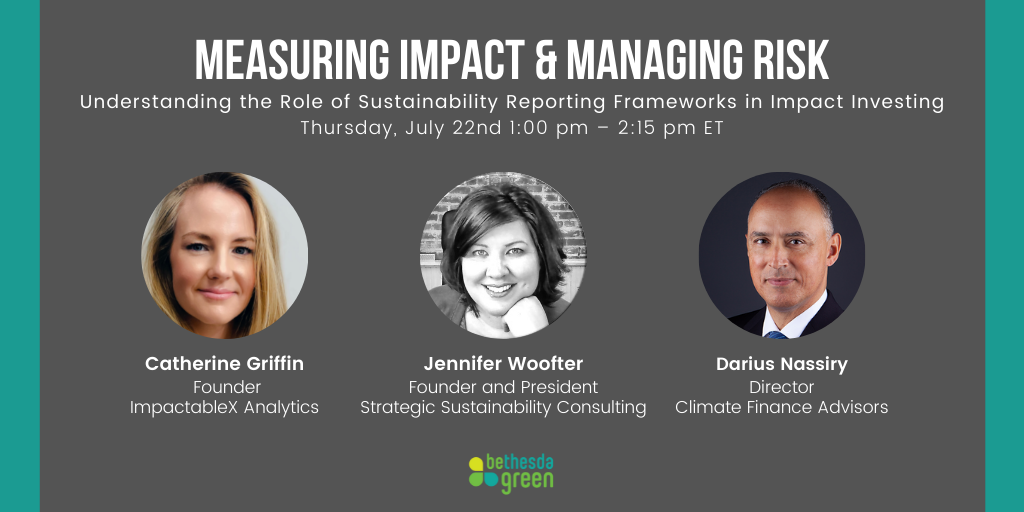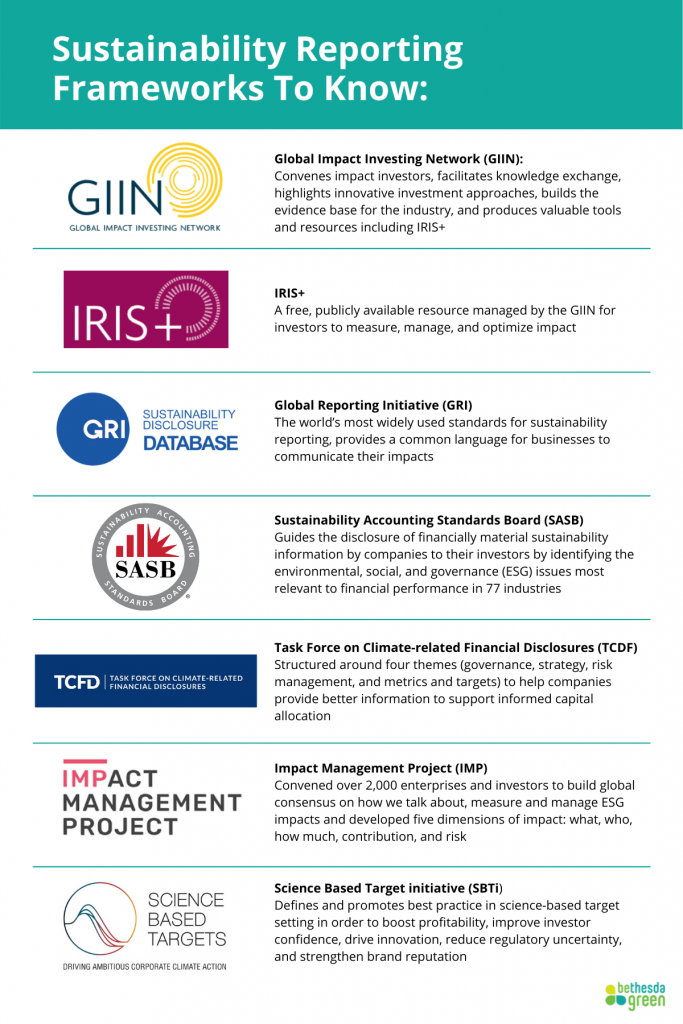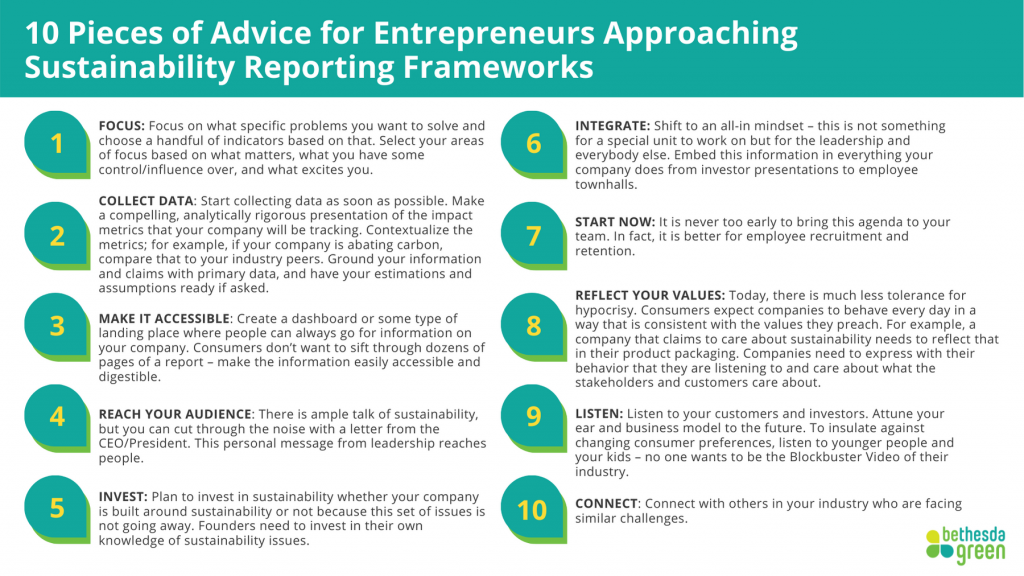2021 Summer Speaker Series: Tackling Environmental Challenges Through Sustainable Entrepreneurship
Building off the success of last year’s summer speaker series, Bethesda Green’s Innovation Lab is once again bringing together founders, industry experts, and policy makers for a series of conversations that will inspire and educate all who attend.
During our 2021 Summer Speaker Series, 14 industry experts are coming together to discuss two primary topics: 1) Building Sustainable and Ethical Supply Chains and 2) Measuring Impact and Managing Risk.
The following is a summary of the first session, hosted on Thursday, July 22, 2021.
Session #1: Understanding the Role of Sustainability Reporting Frameworks in Impact Investing
Panelists included Catherine Griffin, the Founder of ImpactableX Analytics, Darius Nassiry, a Director at Climate Finance Advisors, and Jennifer Woofter, the Founder and President, Strategic Sustainability Consulting.
Watch the full session on YouTube here:
https://www.youtube.com/watch?v=9vzr1bU23ak

Investors use a variety of sustainability reporting frameworks to track the individual and aggregate impact of their portfolio members. During this session, we discussed how companies can choose to make it easier to connect with mission-aligned investors by clearly communicating their own successes to investors and other stakeholders using data-driven metrics. We also discussed which sustainability reporting frameworks founders should be paying attention to right now and how to determine which framework is right for their company.
Jennifer Woofter kicked off the conversation by reporting that the use of the Global Reporting Initiative (GRI), despite its initial preeminence, has plateaued because not enough new companies want to commit the time and resources necessary for the disclosure of 100+ indicators. She discussed how the Sustainability Accounting Standards Board (SASB) emerged to help fill the growing data void by requiring far fewer indicators and tailoring them to specific industries, allowing better comparison between peer companies. Woofter predicted that we will continue to see the reporting frameworks harmonize, leaving room for a few industry-specific standards as well. In particular, she predicted that prevailing standards will focus on “the big 3”: climate; diversity, equity, and inclusion; and cybersecurity (data security and privacy).
The driving force behind the renewed focus on sustainability reporting frameworks is the recognition that climate change is a very real problem that must be addressed and that will shape the economy for decades to come. In the past, only impact investors were concerned with sustainability, but it has now become mainstream. In fact, one need look no further than BlackRock’s historic 2020 announcement that it is making sustainability its new standard for investing.
Darius Nassiry reminded founders that even startups need to think about their sustainability plan and how they will report on it. He said that even if founders are not yet ready to utilize a reporting framework like the GRI or SASB, they should still recognize that they will soon be operating in a new era in which both investors and customers will expect that companies track and report on their environmental impact. Included below is an overview of the major sustainability reporting frameworks that we discussed during the session.
These are just a sampling of the many reporting frameworks that exist. Catherine Griffin explained how her company, ImpactableX Analytics, helps early stage social impact entrepreneurs identify the metrics that are most meaningful and measurable for them. In particular, ImpactableX helps entrepreneurs who are generating positive social value through the sale of products and services evaluate the relationship between revenue and impact creation. Through this perspective, social and environmental issues are opportunities rather than risks.
Measurement is critical because according to research from the Global Impact Investing Network (GIIN), “97% of respondents [impact investors] noted that measuring social and environmental performance is ‘very important’ or ‘somewhat important’ because doing so can have business value—that is, it can improve the financial performance of investments and inform investment decisions.” Understanding this viewpoint will help entrepreneurs pick investors that align with their mission.
It can be challenging to discern what is in fact sustainable and what is ‘good enough’ to achieve the standards of sustainability given our evolving understanding of climate science and changing societal expectations for businesses. For instance, stakeholders used to focus their attention on pollution levels and how to clean up the mess companies made. Today, the emphasis is on carbon and transition risks alongside physical risks. Nassiry noted that the economy itself is changing expectations about what is ‘good enough’ and more attention is being paid to the broader sustainability profile of a company. Companies are now expected to have a positive impact just by opening their doors – if you are not reducing carbon emissions, you are creating them.
Sustainability reporting frameworks help to provide answers to the questions of what is sustainable, and what is ‘good enough’ by helping companies and investors keep track of the moving goalposts about what society expects. Our panelists agreed that companies at all stages must be aware of sustainability reporting frameworks and how they play a role in investment decisions.
Sustainability reporting is also key for maintaining companies’ “social license to operate” said Nassiry. When adopting this lens, it is suddenly not a question of whether to report your impact, but how to report it. This is further evidenced when you consider that transparency is no longer just in the hands of reporting entities. Technological advancements such as mobile phones with cameras and satellite imaging make it easy for activists, customers, and even competitors to track the behavior of companies of all sizes. Transparency is now being provided on a much more frequent and less voluntary basis.
Woofter shared that many companies unfortunately use sustainability reporting to congratulate themselves rather than reflect a true accounting of their current sustainability policies and impact. She said that in her experience, the companies that seem the most credible on issues of sustainability are honest about their shortcomings, which makes customers believe in them more.
Consumers want to emotionally connect to the brands they love and that happens when brands communicate vulnerability and invite their stakeholders along on their journey. For this reason, strong storytelling can be a really powerful tool for startups that do not have the ability to carry out every sustainability initiative that they want to right now. Woofter cited Unilever as an example of a company that is doing this right. In 2020, Unilever CEO Alan Jope said, “The Unilever Sustainable Living Plan was a game-changer for our business. Some goals we have met, some we have missed, but we are a better business for trying. It has required immense ingenuity, dedication and collaboration to get to where we are now. We have made very good progress, but there is still more to do.”
For companies weighing green business certifications and comparing them to sustainability reporting frameworks as a way to track their impact, our panelists had some advice. Griffin noted that for businesses that are driving impact through the sale of products and/or services, green business certifications are less applicable, and suggested that such companies may want to consider conducting a lifecycle analysis.
Woofter shared that her company, Strategic Sustainability Consulting, became a certified B Corp early on, but has not renewed the certification. In recognizing that time is a small business owner’s most valuable asset, and that leaders need to be able to make the business case for any action they take, she felt that being a B Corp was not bringing in customers. As an alternative to a green business certification, she recommends pursuing reporting frameworks such as SASB or the Task Force on Climate-related Financial Disclosures (TCFD).
In contrast, Nassiry stated that Climate Finance Advisors is a certified B Corp, a status which their team feels contributes to their organizational identity of a woman-owned, socially responsible business.
For more information and different perspectives on green business certifications, attend our August 5th speaker series session in which we will examine several green business certifications and their respective costs and benefits. Learn more and register here.
Thinking about ways to utilize sustainability reporting frameworks? Here are some tips our panelists shared:
Bethesda Green’s Summer 2021 Speaker Series: Tackling Environmental Challenges Through Sustainable Entrepreneurship continues through August 26th.
Learn more about our upcoming panels and register here.
About the Author:
Caroline Davenport joins the Bethesda Green team as the Innovation Lab’s Impact Intern. She will graduate in December 2021 from the University of Maryland with a Bachelor of Arts in Public Policy and minors in Spanish and Sustainability.






